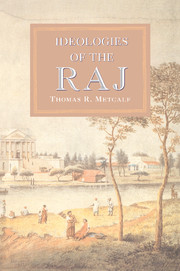3 - The creation of difference
Published online by Cambridge University Press: 28 March 2008
Summary
For the Rede Lecture at the University of Cambridge in 1875, after his return from seven years as law member of the Viceroy’s Council in India, Henry Maine set out to explain ‘The Effects of Observation of India on Modern European Thought’. India shared with Europe, he said, as Sanskrit scholarship since the time of William Jones had revealed, a ‘whole world’ of Aryan institutions, customs, laws and beliefs. India was thus part of that ‘very family of mankind to which we belong’. Yet, he went on, those Aryan institutions had ‘been arrested in India at an early stage of development’. The country was, as a result, ‘a barbarism’, but it remained one which ‘contains a great part of our own civilisation, with its elements as yet inseparate and not yet unfolded’. India was implicated with Britain, somewhat paradoxically, in a common origin, and yet was fundamentally different. In much the same way, the British were, in Maine’s view, at once agents of ‘progress’, charged with setting India on the road to modernity, and at the same time custodians of an enduring India formed forever in antiquity. As Maine put it in the conclusion to his Rede lecture, India’s rulers had to keep their watches set simultaneously to two longitudes. Throughout the later nineteenth century, as they constructed their ‘India’, the British had always to negotiate this disjuncture: between an acknowledgement of similarity, and an insistence upon difference. The task was never to be easy, nor was the result to be a coherent ideology of rule.
- Type
- Chapter
- Information
- Ideologies of the Raj , pp. 66 - 112Publisher: Cambridge University PressPrint publication year: 1995

